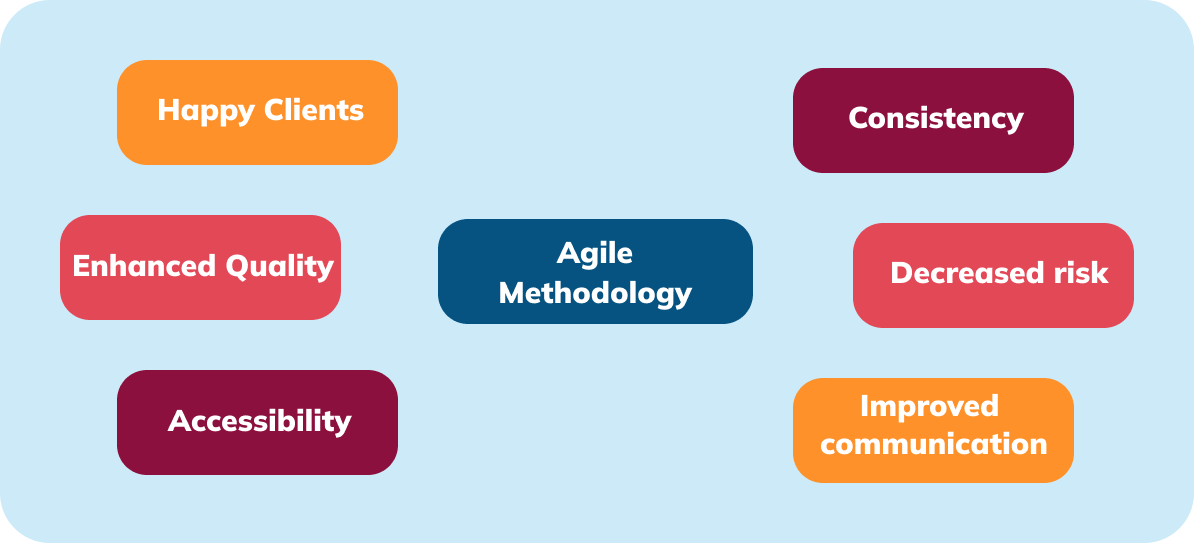Agile methodology has emerged as one of the most well-liked and widely-adopted approaches in
software development and project management due to its flexibility and capacity to provide
more practical business value, with 71% of US companies and 61% of respondents from 76
countries reporting that they use it. Statistics show that agile methodology in software
development has a competitive advantage because 27% of organizations use it to boost
productivity and effectively manage projects. Simultaneously, 66% of businesses assert that
agile projects have quicker turnaround times and better velocity.
It is possible to stick with the conventional project management approach,
such as the waterfall methodology. However, if you don't adopt the Agile
Software Process, you can miss out on various chances to enhance the speed,
quality, and other aspects of your software development projects. So, what
are some specific advantages of the agile methodology? To find out, keep reading this blog
post.
What Is Agile Methodology?
Software development projects are managed using an agile methodology, which divides each project into manageable segments. It places a strong emphasis on iterative development, continuous improvement, stakeholder engagement, customer interaction, and continuous delivery. Delivering functional software to customers as soon and frequently as feasible allows for input from them to be gathered throughout the development process, which is the main tenet of agile software development. This makes it more likely that the finished product will match the user stories and the clients' requirements.
Advantages of Agile Software Development
As different teams follow best practices, the advantages of Agile Software Development will vary from situation to situation. However, it is widely acknowledged that Agile provides the following fundamental advantages:
Happy Clients
Agile teams interact with their customers and show that they value their opinions by incorporating their comments into the development process. Stakeholders want to be involved at every project stage to provide input and guarantee that the finished result will meet their needs. These custo mized outputs will probably enhance user experience generally and increase client retention.
Enhanced quality
Agile project management practices an iterative approach, in which procedures are enhanced with each iteration. One of the fundamental ideas of Agile is that continuous improvement and quality control lead to better products.
Accessibility
Flexibility is Agile's main tenet. Agile teams can easily adjust to change and do so at the last minute with little disruption. Since project deliverables are flexible, teams may review their strategies and realign their priorities to meet revised objectives. Adaptable teams can deliver consistently and successfully handle clients' shifting requirements.

Consistency
Sprints are the short periods during which agile teams work. It is simpler for project managers to assess team performance and allocate resources by these predetermined durations (such as two weeks). Additionally, the estimation process is made simpler because expenses are easier to predict for short-term projects than long-term ones.
Decreased risk
Developers constantly evaluate their progress during sprints, giving them increased project visibility and the ability to identify possible roadblocks rapidly. Before they worsen, these minor issues can be fixed, resulting in an effective risk mitigation strategy and raising the project's chance of success.
Improved communication
Face-to-face contact and ongoing interaction are prioritized by agile teams. To make sure everyone is on the same page and pursuing the same goals, they typically hold daily meetings. In order to properly accomplish their goals, they must regularly communicate with one another to clear up any potential confusion.
Concluding Note
One of the top software development methodologies on the market is agile. It makes it possible for customers and developers to have frank discussions about the project and make improvements. However, occasionally Agile approaches will not produce the desired outcomes if the software development team is short on experienced developers. In order to operate on both small- and large-scale projects, firms must employ an Agile Software Development team with experience and skills. The developers must fully utilize all the agile method's benefits, approaches, and capabilities in order to deliver the finest software solution on time and within budget.
